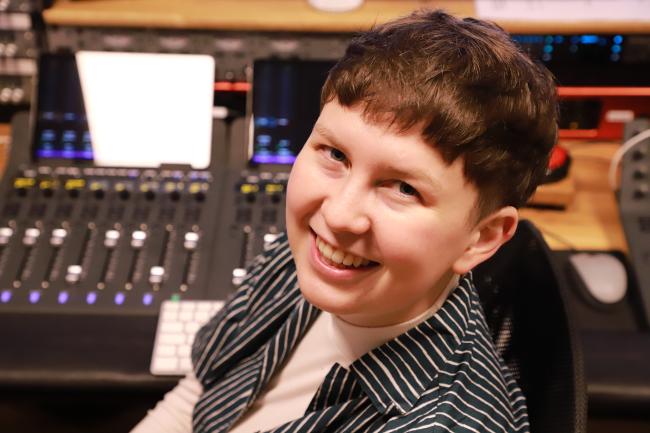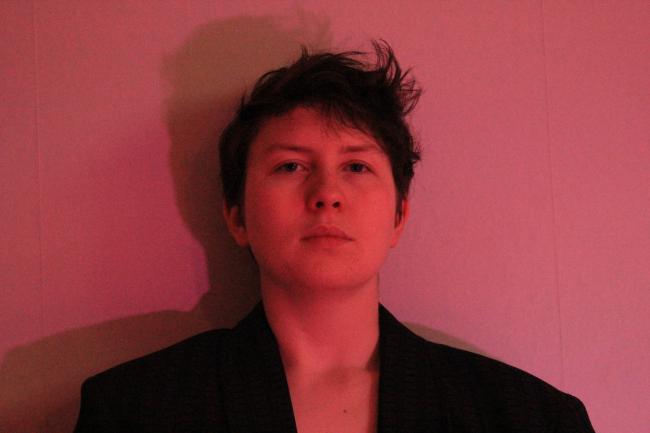Hard work, patience and dedication the recipe for success
2024-03-08Our alumna Julia Bengtson from Borlänge has an extensive music education, having studied at Musikkonservatoriet Falun, exchange studies at the Norwegian Academy of Music, and not least a degree in Music Production at Ingesund School of Music. Currently, she is studying music at the Academy of Music and Drama in Gothenburg.
Was it always clear to you that you wanted to be a musician and producer?
"Absolutely not. I chose the natural sciences programme in upper secondary school and thought I would have a “real” profession – doctor or something like that – which is what many of my friends were aiming for. Music has always been a part of my life, however. I started playing the violin the summer before I turned four. I attended music school throughout my whole upbringing, but I saw music as more of a hobby. After graduation, I took a year off to try and think of what I wanted to do next. Due to luck and good timing, I ended up at Musikkonservatoriet Falun, despite submitting my application way too late. I thought I’d do that for a year, just for fun. When it came time to take the next step, and all my friends were applying to folk high schools and universities, I felt like: “If I’m not playing music next year, what am I doing?” I started looking and found Ingesund Music School and the Bachelor Programme in Music Production. So my choices when it comes to education and career have really been off-the-cuff and spontaneous."
How come you chose to study Music Production at Ingesund?
"When I realised I wanted to continue to pursue a career in music, it was too late to apply to most of the other degree programmes I would have considered. Luckily, the deadline for the Bachelor Programme in Music Production at Ingesund was later in the spring, so I managed to apply in time. Again – luck, timing and spontaneity. I’m incredibly happy I ended up at Ingesund."
You are a folk musician who explores the interplay between violin, vocals and electronic sounds. Are you alone in this niche or do you have colleagues who do similar things?
"I have colleagues exploring the same kind of musical landscapes. Sara Parkman, Samuel Långbacka (his stage name is Looptok) and bands such as Ævestaden are a few examples."
It is important to find your own niche?
"Yes and no. For me, it was about finding a niche I could really explore more in-depth, and this guided me in deciding on a direction. It becomes easier to justify artistic choices if you can relate them to a certain niche. It goes beyond your own self in a way that I appreciate. There is also strength in having a wide range!"
The music industry can be tough and challenging. What advice do you have for aspiring music producers? Is dedication to music enough or do you need to be equally interested in self-promotion?
"Most of all, I think you have to allow things to take time. You need to work hard and have patience. This might sound harsh, but it’s true. Anyone who waits around hoping to be discovered will probably have to wait for a long, long time. Sure, you need a bit of luck, but most of all you have to create the right conditions for yourself. I think it was Ingemar Stenmark who said: “I don’t know anything about luck, except that the more I train, the luckier I get.” I really believe that consistency is the key. As long as you have the will and fortitude, just keep at it! Your efforts will pay off. As for promotion – it starts with you being easy to work with. That you’re on time and so on. I also think it’s more valuable to spend time on what it is you want to promote, rather than see self-promotion as a goal in itself. Build a portfolio of songs, make sure you can show what you do, prepare your links, finish your projects. If you do, it will be easier to promote yourself since you have something concrete to show. It's always easier to listen to music than just talk about it. Your dedication to your work will shine through."
Why should someone who wants to become a music producer apply to the Bachelor Programme in Music at Ingesund Music School?
"Because the faculty here is incredibly competent and because the environments – both the facilities and the scenic surroundings – are lovely to spend time in. One of the strengths of the school is that it’s not too big. You get to know most of the fellow students at the school, and the teachers get a good overview of each student. This, in turn, results in a high-class education adapted more adjusted to each individual. The school is never entirely closed, which provides maximum access to practice rooms, studios and more. This really makes the school unique!"
Congratulations on your recent grant from Veronica Öhmans Stidendiestiftelse! Veronica Öhmans Stipendiestiftelse is part of Fredrika Bremer Förbundets Stipendiestiftelse. According to the criteria, the grant is awarded to recipients who encourage young women who are studying music (and other artistic fields). Recipients also combine tradition with a desire to explore, as well as openness with quality and expertise. How important is it to acknowledge women in music and other artistic fields?
"It’s super important. The music industry is largely male-dominated, not least music production. It’s incredibly important that everyone, regardless of gender, ethnicity, background, etc., are given the opportunity to be seen and heard. It’s in everyone’s interest and it can promote a broader range of artistic expression in the industry. It feels good to be part of this development. Many women have led the way before me, and if I can lead the way for someone else, I’m happy."
How will you use your grant?
"I will use it to delve deeper into scenographic lighting, which is an area currently I’m exploring. The grant will also help pay for a new bow. If there’s any left, I will use that for my debut album which is out this autumn. Keep your eyes open for that!"




